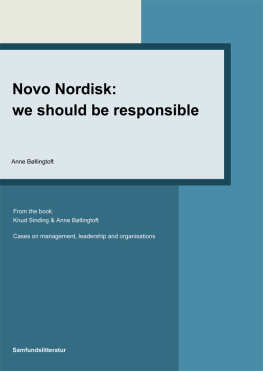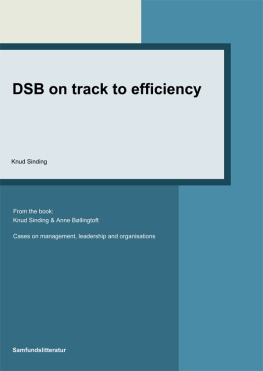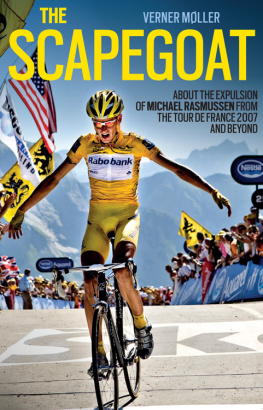Bøllingtoft - Leaders at A.P. Møller - Mærsk Cases on Management, Leadership and Organisations
Here you can read online Bøllingtoft - Leaders at A.P. Møller - Mærsk Cases on Management, Leadership and Organisations full text of the book (entire story) in english for free. Download pdf and epub, get meaning, cover and reviews about this ebook. City: Samfundslitteratur, year: 2013, publisher: Samfundlitteratur;Anne Bøllingtoft, Samfundslitteratur, genre: Business. Description of the work, (preface) as well as reviews are available. Best literature library LitArk.com created for fans of good reading and offers a wide selection of genres:
Romance novel
Science fiction
Adventure
Detective
Science
History
Home and family
Prose
Art
Politics
Computer
Non-fiction
Religion
Business
Children
Humor
Choose a favorite category and find really read worthwhile books. Enjoy immersion in the world of imagination, feel the emotions of the characters or learn something new for yourself, make an fascinating discovery.
- Book:Leaders at A.P. Møller - Mærsk Cases on Management, Leadership and Organisations
- Author:
- Publisher:Samfundlitteratur;Anne Bøllingtoft, Samfundslitteratur
- Genre:
- Year:2013
- City:Samfundslitteratur
- Rating:5 / 5
- Favourites:Add to favourites
- Your mark:
- 100
- 1
- 2
- 3
- 4
- 5
Leaders at A.P. Møller - Mærsk Cases on Management, Leadership and Organisations: summary, description and annotation
We offer to read an annotation, description, summary or preface (depends on what the author of the book "Leaders at A.P. Møller - Mærsk Cases on Management, Leadership and Organisations" wrote himself). If you haven't found the necessary information about the book — write in the comments, we will try to find it.
Bøllingtoft: author's other books
Who wrote Leaders at A.P. Møller - Mærsk Cases on Management, Leadership and Organisations? Find out the surname, the name of the author of the book and a list of all author's works by series.
Leaders at A.P. Møller - Mærsk Cases on Management, Leadership and Organisations — read online for free the complete book (whole text) full work
Below is the text of the book, divided by pages. System saving the place of the last page read, allows you to conveniently read the book "Leaders at A.P. Møller - Mærsk Cases on Management, Leadership and Organisations" online for free, without having to search again every time where you left off. Put a bookmark, and you can go to the page where you finished reading at any time.
Font size:
Interval:
Bookmark:
Anne Bllingtoft
Leaders at A.P. Mller - Mrsk

Anne Bllingtoft
Leaders at A.P. Mller - Mrsk
From the book:
Knud Sinding and Anne Bllingtoft
Cases on Management, Leadership and Organisations, 1st edition 2012, chapter 9
1st e-book chapter 2013
Samfundslitteratur 2012
Cover design: Klahr|Graphic Design
Typeset: SL grafik, Frederiksberg
E-book production: Rosendahls BookPartnerMedia
ISBN: 978-87-593-9536-3
Samfundslitteratur
Rosenoerns All 9
DK-1970 Frederiksberg C
Denmark
Tlf: + 45 38 15 38 80
Fax: + 45 35 35 78 22
www.samfundslitteratur.dk
All rights reserved.
No part of this publication may be reproduced or used in any form or by any means graphic, electronic or mechanical including photocopying, recording, taping or information storage or retrieval system without permission in writing from the publisher.
CHAPTER 9
LEADERS AT A.P. MLLER - MRSK
The A.P. Mller - Maersk Group is greatly admired in the Danish business community. Over a period of 47 years (1965-2012), the company has had only three CEOs. Different personalities and different leadership styles have characterised the three leaders. But how much influence does management style actually have on the company?
1993 was a historic year for Maersk. It was the year Mrsk Mc-Kinney Mller handed over the daily management of the company to Jess Sderberg and thus put an end to a long and admirable career. Mrsk Mc-Kinney Mller is considered to be the man who turned Maersk into a worldwide enterprise. He has become an icon in the history of the Danish business community, and numerous articles and books have been written about him and the company. His successors have also received their share of media attention, but it seems that Mrsk Mc-Kinney Mller is still, in many ways, synonymous with the company, even though he passed away in April 2012 at the age of 98.
Maersk is a company with over 100.000 employees and operations in approximately 130 countries worldwide. Operations cover a range of sectors, primarily transport, extraction of oil and natural gas as well as supermarkets. Although known in Denmark under the name A.P. Mller - Mrsk, the company is known internationally as Maersk, and is especially known for its shipping operations. Its headquarters are located in Copenhagen.
The companys roots can be found in the shipping company that the 67-year-old captain, Peter Mrsk Mller and his 27-year-old son Arnold Peter Mller founded in Svendborg, Denmark in 1904. The current company, A.P. Mller - Mrsk A/S, was unveiled in 2003 after a merger between the Maersk shipping companies D/S 1912 and D/S Svendborg. Before the merger, Maersk wasnt actually a group because the two shipping companies owned all companies in the group in a 50-50 arrangement. This design made it extremely difficult for outsiders to get an overview of the groups finances.
Mrsk Mc-Kinney Mller: Industriousness
Mrsk Mc-Kinney Mller was described as a very principled man with a clear set of values that have prompted the conservative orientation of the company for over half a century. As a young man, he managed Maersks interests in the USA during the Second World War occupation of Denmark, and was known as hardworking, formal and very strict. He spared neither himself nor his employees. One of the then employees in New York reported:
He liked people to run fast. It wasnt enough that you did things fast; it also had to be visible that you were working fast.
To avoid people hiding or taking unnecessary breaks, it was required that the employees work with their doors open. It was a part of the disciplining, as it was referred to in the office. Mr. Mller also insisted on approving all decisions made. A former employee recalls a typical statement:
Then you will not have to worry about whether you have made a misjudgement.
Even during his time in the USA, Mr. Mller was, as a general rule, always both the first and last person at the office. Saturday was also a workday. The first Saturday he took off in three years was on his wedding day, but besides that family was rarely his first priority. His wife Emma once said that 80% of his time went to the company and 20% to his family. Mr. Mller worked hard and dutifully towards his position as future head of the group. Although Mr. Mller was born into a rich family, it didnt necessarily mean that things were handed to him. Stories about his childhood and upbringing are known within the group. The fact that Mr. Mller in his childhood swept the sidewalk for a pay of 50 cents a month, with a deduction of 2 cents for each forgotten day, is just one of the many stories known throughout the company.
When Mr. Mller took over the company in 1965 from his father Arnold Peter Mller, people had tremendous respect for him from the very first day. He was considered by the employees to be accurate, tough and fair. He was systematic and meticulous in his organisation of the company, and he had a sharp eye for detail. Yet he was also sensitive to his employees and his door was always open. However, there was no doubt that the decision making authority in the company belonged to Mr. Mller himself and a very few senior executives. He was always very direct in his criticism of employees, especially management. Things were always told like they were and even the most trustworthy employees werent exempt from criticism. He was especially hard on the employees that tried to get away with the easiest solutions, and with the employees that concealed anything from him. He would ignore traditional lines of command, and bypass managers and supervisors to get a detailed overview of what was happening at all levels of the company. His own description of what a manager should possess in 1971 was as follows:
It should be people who have achieved something. Next, it should be people with the ability to lead and interact with other people. We would also like energetic people. Energetic in the sense that they should be willing, when required, to work beyond normal working hours. They must be decent, honest and competent. A manager should be skilled, diligent and talented. He should be wise and have flair for language. He must be able to lead, inspire and motivate, and above all be loyal.
During the time of the leadership of Mr. Mller, myths about him and the company have flourished in the public. According to Ole Lange, an emeritus professor at Copenhagen Business School, Maersk, and not least Mr. Mller himself, have contributed greatly to these. They have helped to build the aura of infallibility and success, which has always surrounded both the man and the company.
The myths range widely from personal ones about Mr. Mllers legendary leadership style and habits to Mr. Mllers power over politicians, and the secretiveness, which has characterised the company for many years.
Most of the myths and stories involve Mr. Mller. There is the one about the employee who inadvertently took the elevator at headquarters and was met with an angry reprimand from the CEO: Here, we use the stairs, young man. There is also the story about Mr. Mller going through the large employee canteen at headquarters once a week and inspecting everything from loose ceiling tiles to defective fluorescent light bulbs. There were stories about the eagerness to save money, which meant that employees werent allowed to use napkins, only paper towels. Also, Mr. Mller is rumoured to have said:
If they open you up your blood should be blue, and instead of a heart there should be a seven-point white star.
Professor Lange from Copenhagen Business School described the mythology of Mrsk in an interview:
Next pageFont size:
Interval:
Bookmark:
Similar books «Leaders at A.P. Møller - Mærsk Cases on Management, Leadership and Organisations»
Look at similar books to Leaders at A.P. Møller - Mærsk Cases on Management, Leadership and Organisations. We have selected literature similar in name and meaning in the hope of providing readers with more options to find new, interesting, not yet read works.
Discussion, reviews of the book Leaders at A.P. Møller - Mærsk Cases on Management, Leadership and Organisations and just readers' own opinions. Leave your comments, write what you think about the work, its meaning or the main characters. Specify what exactly you liked and what you didn't like, and why you think so.













